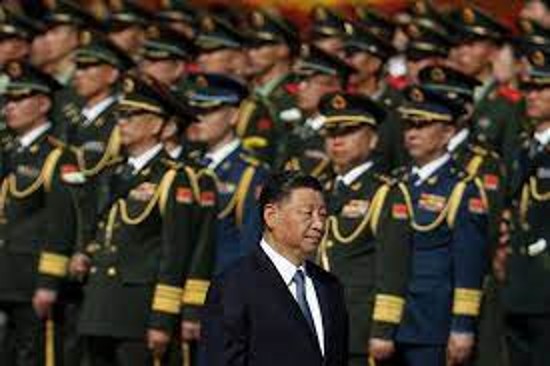US intelligence reports reveal that Xi Jinping initiated a comprehensive military purge in response to revelations about the defective state of China’s missiles. These missiles were found to be filled with water instead of the required fuel, compromising their functionality. The intelligence suggests that widespread corruption within the military had impeded Xi’s endeavors to modernize and raise combat readiness.
In light of these findings, President Xi’s actions are interpreted as a strategic move to eliminate corruption within the armed forces and bolster their preparedness for potential military engagements. The compromised state of the missiles raised concerns about China’s ability to effectively participate in warfare.
What assurances does Xi Jinping provide regarding the effectiveness of the military purge in restoring the operational capabilities of China’s armed forces and ensuring global stability?
Join us on Telegram: https://t.me/tfiglobal
US officials, preferring anonymity while discussing intelligence, reveal that extensive corruption within China’s Rocket Force and defense industrial base has diminished the likelihood of President Xi Jinping considering major military actions in the near future. The impact of corruption is evident in various instances, such as missiles filled with water instead of fuel and malfunctioning lids on missile silos in western China, hindering effective missile launches.
The US assessments emphasize that corruption within the People’s Liberation Army, particularly in the Rocket Force, has eroded confidence in China’s military capabilities. Additionally, this corruption has impeded President Xi’s key modernization priorities. Over the past six months, a significant graft probe has unfolded, ensnaring more than a dozen senior defense officials. This development is considered one of the most extensive crackdowns on corruption within China’s military in modern history, reflecting a concerted effort to address systemic issues affecting the nation’s defense apparatus.
US officials assert that despite the ongoing purge in China, President Xi Jinping’s political standing has not weakened. Instead, they argue that Xi’s decisive removal of senior figures, even those previously elevated during his leadership, underscores his firm grip on the Communist Party.
Is China’s military corruption crackdown the real-life version of ‘Xi’s Defense Apprentice,’ where senior officials are fired in creative ways?
Spokespeople from the White House National Security Council did not immediately respond, while Lieutenant Colonel Martin Meiners, a Pentagon spokesman, referred to the Department of Defense’s annual China report, highlighting Xi’s efforts to intensify anti-corruption investigations within the People’s Liberation Army.
Read More: The Philippines has choked China and the Paper Dragon is out of options
Efforts to obtain comments from China’s Defense Ministry were unsuccessful over the weekend in Beijing. Historically, US policymakers have expressed frustration with intelligence agencies’ limited insights into Xi’s inner circle, particularly evident in surprises such as the swift consolidation of control in Hong Kong and the militarization of the South China Sea.
President Xi Jinping has allocated substantial financial resources, amounting to billions of dollars, toward his goal of modernizing China’s military by 2027. A key aspect of this initiative involved the elevation of the Rocket Force, intended to play a crucial role in any potential invasion of Taiwan, a self-ruled territory. Notably, corruption has been identified as a significant hindrance to military effectiveness, a concern echoed by People’s Liberation Army (PLA) researchers since as early as 2014, who have identified corruption as the primary factor impairing the military’s combat capability.
Is President Xi Jinping’s modernization goal of 2027 a race against time, or is it more of a ‘billions of dollars and counting’ marathon for China’s military?
Recent months have witnessed visible manifestations of Xi’s anti-corruption efforts. In the most recent episode on December 29, China’s top legislative body ousted nine defense figures, with five having connections to the missile force and at least two associated with the Equipment Development Department, responsible for arming the military. These actions align with Xi’s broader agenda to address corruption within the military apparatus and bolster the integrity and efficiency of China’s armed forces.
Recent developments include the public removal of three executives from state-owned missile manufacturers by China’s primary political advisory body. This series of purges follows the October dismissal of China’s former defense minister, Li Shangfu, who held the position for only seven months.
Notably, the military’s corruption investigations differ from other parts of the Chinese system, as they are not publicly announced. In November, a Rocket Force major-general was discreetly ousted from Beijing’s municipal legislature, as reported by Chinese news outlet Caixin.
Did the military’s corruption investigations get their own secret handshake, or is it just a silent, stealthy process keeping everyone in the dark?
Read More: China Has Possibly Flared a Diplomatic Spat Between India and Russia. But It is Failing Already
Public indications of President Xi Jinping’s anti-corruption efforts within the armed forces surfaced in July. China’s top military body introduced a new mechanism to detect and prevent corruption risks, coinciding with the Equipment Development Department’s launch of a retrospective graft probe during Li’s tenure.
The Chinese military’s official newspaper, in a January 1 editorial, committed to a “war on graft” for the year, suggesting the possibility of additional purges in the near future.
In an uncommon move, the department disclosed eight issues under investigation, including “leaking information” and assisting certain companies in securing bids. Subsequently, reports emerged of three high-ranking Rocket Force chiefs undergoing probes and subsequent removal.
As Rocket Force chiefs undergo probes and state-owned missile manufacturers face public purges, the transparency and impact of these measures remain open to interpretation. Is China truly on the brink of a new era of military integrity and efficiency, or are these efforts merely a façade for a more intricate political chess game within the People’s Liberation Army? Only time will tell how these anti-corruption initiatives will shape the future of China’s defense apparatus and its standing on the global stage.
